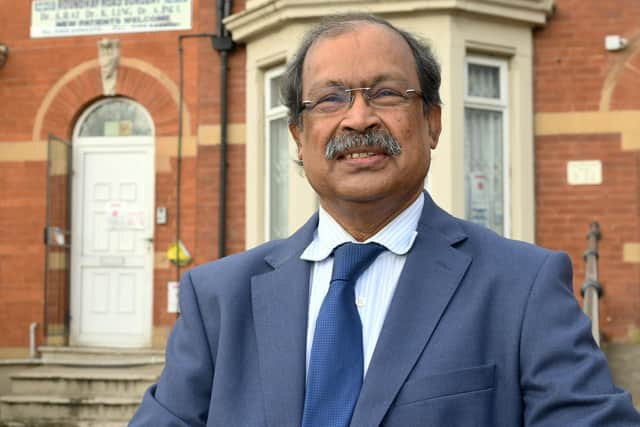Unfounded fertility fears are stopping young people having COVID jabs and boosters says leading Leeds GP
and live on Freeview channel 276
The Leeds areas of LS8 and LS9 have some of the lowest vaccination figures in the country according to public health records and, despite work by Leeds City Council and medical teams, there has been no “significant” change in the numbers of people, especially those from ethnic backgrounds, taking up the offer.
Dr Amal Paul is the GP at Roundhay Road surgery at Harehills and says while patients from black and ethnically diverse communities have been more willing over recent months to get vaccinated, compared to the weeks and months immediately following the vaccine roll-out, there is still more to be done to improve the statistics.
Advertisement
Hide AdAdvertisement
Hide AdThere is also particular resistance, he added, among younger men and women who are worried the vaccine affects fertility and babies.


In its latest guidance, the Royal College of Obstetricians and Gynaecologists (RCOG) states that Covid-19 vaccines are “strongly recommended in pregnancy”.
“Vaccination is the best way to protect against the known risks of Covid-19 in pregnancy for both women and babies, including admission of the woman to intensive care and premature birth of the baby,” RCOG said.
In December, the Joint Committee on Vaccination and Immunisation announced that pregnant women were now considered a ‘vulnerable’ group within the vaccination programme, emphasising the urgency of them receiving Covid-19 vaccination and booster doses.
Advertisement
Hide AdAdvertisement
Hide AdMeanwhile, the British Fertility Society and Association of Reproductive and Clinical Scientists has said that there is “absolutely no evidence” the vaccines “can affect the fertility of women or men”.
He said: “In south Leeds and LS8 and LS9 that is the lowest uptake with the vaccine in the country from public health records. We have done lots of work through public health, the city council and medical teams but there is no significant movement on the uptake.
“I don’t know what we can
do; we are trying to convince people to go for the booster. The story is one and the same, there is mistrust and mis-information.
“People don’t trust the medical people, they think life will be protected by God or it is not safe, like halal.
Advertisement
Hide AdAdvertisement
Hide Ad“Another interesting thing that is affecting young people is they think they will lose their capacity to have a baby – men and women.
“We are trying to work with pregnant women, especially with ethnically-diverse communities to get the first, second or booster as soon as possible,
but there is a lot of work to be done.
“Firstly, there are fears it will affect fertility and whether they can have a child or not, secondly that the unborn baby might be harmed, and thirdly that breast milk will have the vaccine in and it will affect the baby.
“There are a whole range of issues, and issues we need to address carefully. If we want to work with this group we need to engage, talk to them and give data and evidence.”
Advertisement
Hide AdAdvertisement
Hide AdSupport the YEP and become a subscriber today. Enjoy unlimited access to local news and the latest on Leeds United. With a digital subscription, you'll see fewer ads, enjoy faster load times, and get access to exclusive newsletters and content. Click here to subscribe.
Comment Guidelines
National World encourages reader discussion on our stories. User feedback, insights and back-and-forth exchanges add a rich layer of context to reporting. Please review our Community Guidelines before commenting.
